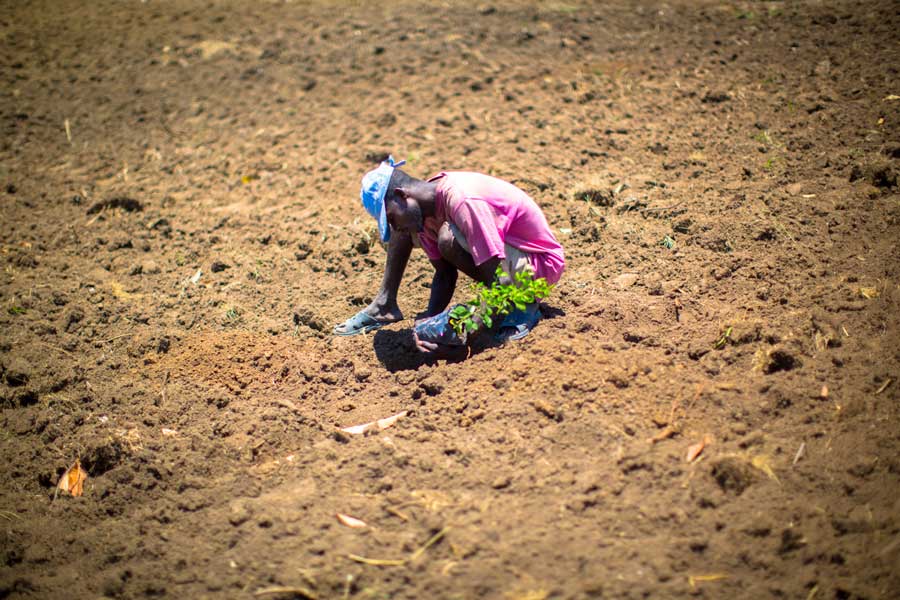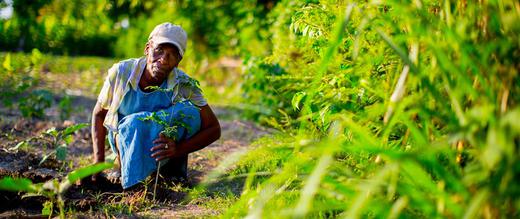The views expressed in our content reflect individual perspectives and do not represent the authoritative views of the Baha'i Faith.
The fundamental basis of the community is agriculture, tillage of the soil. – Abdu’l-Baha, The Promulgation of Universal Peace, p. 217.
One of the central principles of the Baha’i Faith—a spiritual solution to the world’s economic problems—begins with agriculture. Since so many people around the world cultivate and grow food to feed their families and provide their income, and since farmers generate the sustenance for all of humanity, the Baha’i teachings on the economy focus first on the impact of agriculture and its primary importance to every person.
In fact, Abdu’l-Baha outlined a remarkable, unique Baha’i economic model for agriculture, based at the village level and locally controlled to maximize the welfare of all people and the quality and quantity of the harvest:
In brief, from among the wise men in every village a board should be organized and the affairs of that village should be under the control of that board.
Likewise a general storehouse should be founded with the appointment of a secretary. At the time of the harvest, with the approval of the members of that board, a determined percentage of the entire harvest should be appropriated for the storehouse.
The storehouse is to have seven revenues: Tithes, taxes on animals, wealth without inheritors, all things found whose owners cannot be discovered, a third of all treasures (money) found in the earth, a third of the mines, and voluntary contributions.
- General running expenses of the institution — salaries etc., and the administration of public safety, including the department of hygiene.
- Tithes to the general government (State).
- Taxes on animals for the State.
- Support of an orphanage.
- Support of cripples and the incurable.
- Support of educational institutions.
- Supplying any deficiency for the expenses of the poor.
The first revenue is the tithe. For example, if the income of a farmer is five hundred dollars and his necessary expenses are five hundred dollars, no tithes will be collected from him. Another’s expenses being five hundred and his income one thousand dollars, one tenth will be taken from him, for he hath more than his needs; if he giveth one tenth his livelihood will not be disturbed.
Another’s expenses are one thousand dollars, and his income is five thousand dollars; as he hath four thousand dollars surplus, he will be required to give one and a half tenths [15%]. Another hath necessary expenses of one thousand dollars; but his income is ten thousand dollars; from him two tenths [20%] will be required. The necessary expenses of another person are five thousand dollars, and his income one hundred thousand; therefore, one fourth [25%] will be required from him. On the other hand, a person’s income may be two hundred, but his needs absolutely essential for his livelihood are five hundred dollars; provided he hath not failed in effort and exertion or his farm hath not been blessed with a harvest, such a one must be helped from the general storehouse, so that he may not remain in need and may live in ease. – Abdu’l-Baha, extract from a tablet to an individual Baha’i, October 4, 1912, translation corrected at the Baha’i World Centre, December 1985.
This presumptive system—much like the work that some Baha’is are now doing with organic and smallholder farms (for example, check out smallholderfarmersalliance.org, the Haiti-based organization co-founded by the Baha’i activist Hugh Locke) —retains agricultural revenue in a locally-managed and controlled matrix; dedicates a third of land-use revenues (!) from all extractive industries like mining, oil and natural gas; and makes the central village “storehouse” Abdu’l-Baha describes not only a depository but a fiscal repository, a rurally-controlled banking mechanism with taxation and public service responsibilities. It also offers a very specific schema for a graduated income tax based on prosperity and profitability.

a Haitian man is planting crops for Small Holder Farmers Alliance
Today, in many places around the world, those with smallholder farms often remain indebted to the landowner or the government for their entire lives. In this Baha’i model, that kind of indentured servitude or debt bondage would not exist. Instead, smallholder farmers could expect support from the community, as long as they agreed to help support the community in return. A graduated tax on income based on profitability would supply the social needs of the village, as well as protecting farmers against bad crop years and poor yields.
This model of mutual supportiveness and unified community resources would also apply at larger levels, as well. Towns and cities could utilize the same structure, providing the populace with a social safety net that protected the most vulnerable members of society:
No religious books of the past prophets speak of the economic question, while this problem has been thoroughly solved in the teachings of Baha’u’llah. Certain regulations are revealed which insure the welfare and well being of all humanity. Just as the rich man enjoys his rest and his pleasures surrounded by luxuries, the poor man must likewise have a home, be provided with sustenance, and not be in want. Until this is effected happiness is impossible. All are equal in the estimation of God; their rights are one and there is no distinction for any soul; all are protected beneath the justice of God. – Abdu’l-Baha, Star of the West, Volume 6, p. 5.
This spiritual solution to our economic problems insures that no one lives in dire poverty and hunger; and that all people benefit from the Earth’s bounty.
Next: Growing Enough Food to Feed the World

















Comments
Sign in or create an account
Continue with Facebookor